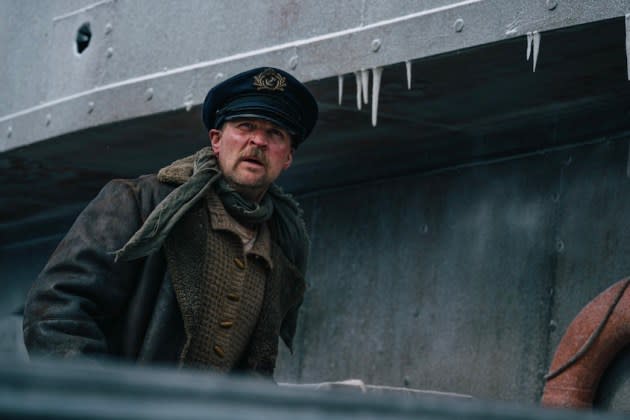‘The Arctic Convoy’ Review: Middling World War 2 Drama Depicts a Perilous Allied Supply Chain to Russia

Half a century ago, Universal Pictures hoped to carry over the success of its entries in the short-lived disaster film vogue to naval combat movies, stirring some box office if few other rewards via dullish “Midway” and “Gray Lady Down,” which felt like bloated retro B-movies. Having revived the disaster genre with trilogy “The Wave,” “The Quake” and “The Burning Sea,” their Norwegian producers seem to be going the same route with “The Arctic Convoy,” about the perilous voyage of a freighter delivering supplies to Allies on the eastern front during World War 2.
The fact-inspired story’s central situation is compelling enough. But director/co-writer Henrik M. Dahlsbakken (of recent biopic “Munch”) delivers a middling effort too sparing of excitement to satisfy action fans, and without the character depth or involvement to score as drama instead. Released on the film’s home turf at Christmas, the competent but uninspired Scandinavian effort has been picked up for U.S. release later this year by Magnolia.
More from Variety
This summer of ’42 involves a fair number of teenage boys, but there’s no Jennifer O’Neill to instruct them in the way of love. Rather, they get considerably harsher lessons of war, with the Nazis occupying Norway despite considerable resistance — including, for some, participation in Allied convoys bearing weapons and supplies to the Eastern Front. One such ship is among a large group traveling from Iceland to Russian port city Murmansk, under heavy threat of Axis attack en route.
Much of the crew are young, inexperienced and terrified. Grizzled Captain Skar (Anders Baasmo) can count on the equally steely resolve of his “right-hand man” — actually the sole woman here, communications officer Ragnhild (Heidi Ruud Ellingsen). But he’s much less sure about the resolve of newly assigned First Mate Mork (Tobias Santelmann), who it turns out had just recently survived captaining a torpedoed vessel. He seems shaky, as does the chief engineer (Olav Waastad) and bosun (Preben Hodneland).
The narrative starts four days into an expected fortnight’s passage, when a U-boat sighting announces the fleet is on Axis forces’ radar. Soon destroyed or disabled, other vessels in the 30-odd transport drop like flies. Worse yet, a couple days later a cryptic message informs our protagonists they are losing their British military escort, for reasons unexplained. (On-screen text at the end informs this was due to false intel, in what became considered one of the major Allied mistakes of the war’s European theater.)
The remaining ships must “scatter,” continuing to their destinations alone, as best they can. This dire news leaks to the common ranks aboard, causing a panic the Captain must quell. Collective spirits also sink when Mork steers the ship into waters that turn out to be mined, leading to a tragic accident.
But conflict between Captain and First Mate enters another sphere once a full-on German attack occurs at the movie’s midpoint. It’s a strong action sequence — unfortunately, the only real one here. While the day is saved to a large extent by the Swedish chief gunner (Adam Lundgren), damage incurred places Mork at least temporarily in command. He takes advantage of that opportunity to reverse the Captain’s orders, even if it might mean his own court martial. Nevertheless, the ship has its own needs, triggering unanticipated course corrections and changes of strategy while emergency repairs are made.
The standoff between quarreling leaders — disrupting a normally strict chain of command — might’ve made for a solid dramatic crux, all the more so since it eventually emerges there’s no “bad guy” here. (Though Mork at first seems weak, even suspicious, some of his decisions ultimately prove the right ones.) But the script doesn’t grant them or any other characters enough dimensionality for this enterprise to click as a psychological thriller, despite a decent cast’s efforts. That also means the film suffers a dip in tension after its first/last major action set-piece midway. The human dynamics aren’t powerfully engaging enough to avoid a sense of letdown, or render the fadeout less anticlimactic — it ought to leave us deeply moved, but “Convoy” never approaches any such emotions.
It’s a watchable if rather pedestrian exercise that could’ve used a more assertive directorial style, among other factors. By default, a major point of interest becomes the grubby interiors and dated technology of the ship itself, reportedly “played” by a preserved 1911 coal hauler that did tours of duty in both world wars.
Otherwise, “The Arctic Convoy” is well-enough crafted on all levels to hold interest and maintain reasonable credibility, if not to make any distinctive impression. It isn’t sufficiently stirring to risk comparison with the prestige war films of recent years (like “Lone Survivor” or “All Quiet on the Western Front”), or so lively that it can recall scrapper B movies in that genre of decades past, like those of Sam Fuller’s. Anyone expecting more in the vein of the “Wave” trilogy’s vicarious thrills will definitely not find it here. Instead, they’ll get an intriguing historical back chapter fictionalized in a way that provides OK entertainment, albeit minus the full gravity or excitement that chapter surely deserves.
Best of Variety
Sign up for Variety’s Newsletter. For the latest news, follow us on Facebook, Twitter, and Instagram.

